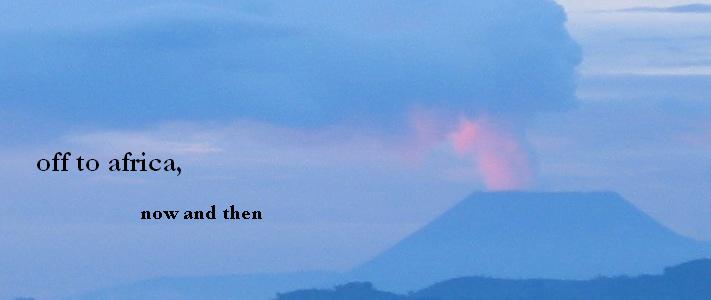When I stopped for coffee this morning, there was an older African man discussing science at a table with an Asian college student. I kept straining to listen to him, trying to figure out where he was from. After a while, the girl went to the bathroom, and the man pulled out a cell phone and there was something about the way he held the phone that he could have been Pastor B. in Rwanda, and then I realized that the way an older man holds a mobile phone in Africa, the way it is somehow the same across the continent, the same slight skepticism of it and the same way he peers through his bifocals, all of that is so familiar to me that I felt a pang of homesickness there in the coffee shop. And then I thought how strange it is that my dad wouldn't even recognize it.
When I was last in Liberia, I called him from Buchanan and let him talk on my mobile phone to Pastor K., and when I got the phone back, my dad and I were chatting and he said, "Well, I'll let you go. I want you to still have money on your phone in case something goes wrong," and I realized what a different world Liberia is now, with little telephone airtime kiosks on every corner, communication available anywhere, how very much more connected to the rest of the world and yet, somehow, four years ago when I was there, Buchanan was still without one single restaurant that served anything but chicken and chips and/or was open on Sunday.
They say that Africa has leapfrogged past land-lines and dial-up internet and gone straight to wireless, and this is mostly true. (I did have a land-line and dial-up internet in Rwanda, along with a mobile phone. Wireless internet was just beginning in some big hotels around the time I left, but my laptop didn't have a wireless card.)
Someone who had lived in Liberia in the 1960s asked me the other day about logistics there now, and I explained how, if you are wealthy, you have a generator for lights and air-conditioners, and an electric pump for water, and you buy drinking water. "But what about communication?" she asked, and I almost laughed, because communication is almost the easy part. Everyone around the world is desperate for communication. There are cell phones, I explained, and you buy a little receiver and get wireless internet from towers, or, I suppose, if you were far out in the bush, you would have a satellite receiver for internet.
The world is so very much smaller than it was when my parents waited in line for the phone at the telecommunications building in Buchanan, or when the photos of my sister's birth never made it by mail to the US.
When I was last in Liberia, I called him from Buchanan and let him talk on my mobile phone to Pastor K., and when I got the phone back, my dad and I were chatting and he said, "Well, I'll let you go. I want you to still have money on your phone in case something goes wrong," and I realized what a different world Liberia is now, with little telephone airtime kiosks on every corner, communication available anywhere, how very much more connected to the rest of the world and yet, somehow, four years ago when I was there, Buchanan was still without one single restaurant that served anything but chicken and chips and/or was open on Sunday.
They say that Africa has leapfrogged past land-lines and dial-up internet and gone straight to wireless, and this is mostly true. (I did have a land-line and dial-up internet in Rwanda, along with a mobile phone. Wireless internet was just beginning in some big hotels around the time I left, but my laptop didn't have a wireless card.)
Someone who had lived in Liberia in the 1960s asked me the other day about logistics there now, and I explained how, if you are wealthy, you have a generator for lights and air-conditioners, and an electric pump for water, and you buy drinking water. "But what about communication?" she asked, and I almost laughed, because communication is almost the easy part. Everyone around the world is desperate for communication. There are cell phones, I explained, and you buy a little receiver and get wireless internet from towers, or, I suppose, if you were far out in the bush, you would have a satellite receiver for internet.
The world is so very much smaller than it was when my parents waited in line for the phone at the telecommunications building in Buchanan, or when the photos of my sister's birth never made it by mail to the US.

No comments:
Post a Comment